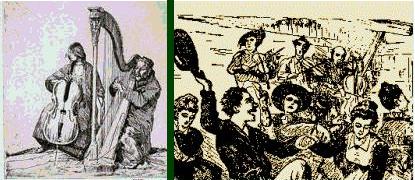What particular things were you taught in the beginning that you feel were most helpful? What things do you wish you were taught earlier?
As she accumulates more adult students, she's wants to consider the issues for adults more closely.
I've placed this question on CBN, too, but perhaps I'll get different, maybe more candid, responses here.

4 comments:
It is easier to be more responsive here than on CBN..
Obviously, adults learn differently than young children. Compare how preschool kids learn a new language, for example - they seem to absorb what they hear and then start using it; while adults start off trying to analyze the new language - studying verb declensions and memorizing vocabularies and noun genders, etc.
Adults also bring that analytical approach to learning an instrument.
Teachers should be open and up-front with their new adult students about the process itself and give them some reasonable expectations. They should explain that we should expect to have to apply a lot of optimism to our playing - for quite some time.
They should start off by providing their adult students specific practice routines - how long to play open strings, various bow exercises, scales, arpeggios, (and later shifting drills, etc.)
They should provide a clear plan for learning new pieces from the first sight-reading and rhythm work, to identifying and working on "tough" parts, then putting it all together again and starting to pick up the tempo, etc.
I wish my teacher had spent some time actually demonstrating what levels I should expect to achieve in the first three months, then six months, and then a year, etc. It sure would have helped me more properly align my expectations.
A lot of my early frustrations came from believing I should be doing better, sooner; which only fed my doubts and paranoia about an adult trying to learn something so difficult so late in life.
Fortunately, through these blogs and forums, I am able to find some solace that I am not alone with these frustrations.
I wish my first teacher had paid more attention to my bow hold and proper bowing technic. I think it's important that the teacher keeps observing the student carefully and commenting on and correcting any "bad habits" before they really become habits.
BTW, Hi Terry ... I've always enjoyed your posts, and now am enjoying your blog.
Cellodonna (cellodreamer on CBN)
Thank you cellodonna for four kind words and contribution here. It is so difficult to understand bowing. It still holds mysteries for me. On a teacher's flowing bow arm, I once asked, "How do you do that?" He replied, "I don't really know, I haven't thought about it since I was 12 years old." In a sense, that was a good answer, better than lengthy word salad that doesn't really make sense.
Guanaco, your response is exceptional. I just have to show it to my teacher. That expectation thing comes up so often in CBN and Cello Chat, but nobody says, "Wait, why isn't the teacher managing this and explaining what to expect?"
I find it helpful when my teacher tells me 'that will come with time, don't worry about it right now' - which sounds random, but it sort of goes to what Guanaco was saying. Knowing where you should expect to be when.
I also like knowing that my teacher struggled with certain things too - my teacher often tells me 'oh god, this took me ages to learn but here's what I figured out...' because it makes me feel less ridiculous.
Totally agree with Guanaco on the how-to-practice, my husband had a lot of trouble with that initially. I didn't, but I learned an instrument when I was young so I already knew that bit.
Post a Comment